Gentle herbal teas offer a natural, effective solution for better sleep without the side effects of pharmaceutical aids. They work by influencing neurotransmitters and hormones that regulate your sleep cycle. Herbs like chamomile, valerian root, and lavender can reduce anxiety, promote relaxation, and improve sleep quality. These caffeine-free options are typically non-addictive and support overall health with their antioxidant and anti-inflammatory properties. By incorporating herbal teas into your nightly routine, you'll create a calming ritual that signals your body it's time to wind down. Discover how different herbs can be blended for personalized sleep-enhancing effects.
Understanding Sleep and Herbal Remedies
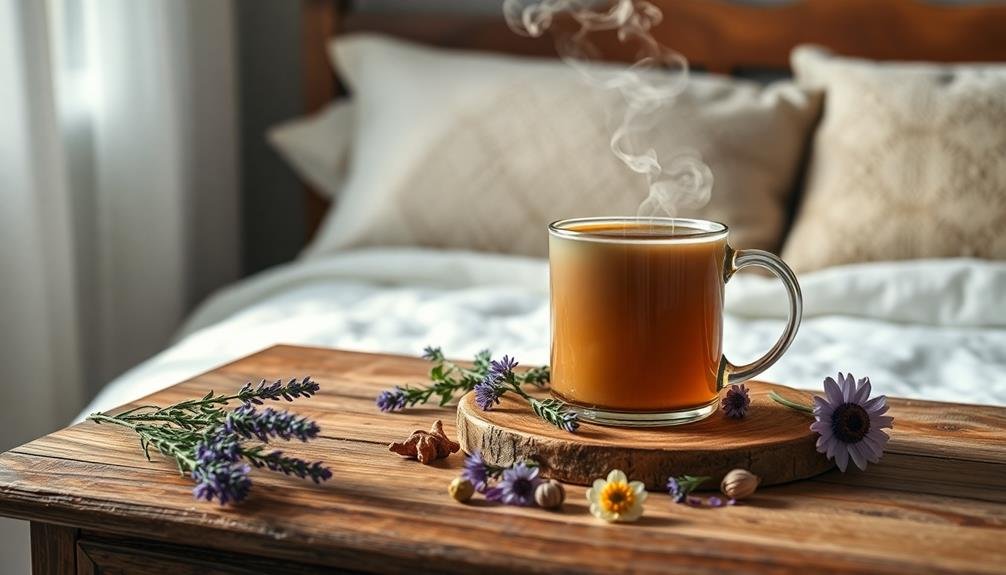
Often, a good night's sleep can feel elusive, leaving many searching for natural solutions. Understanding the science behind sleep and how herbal remedies can help is essential in addressing sleep issues effectively. Your body's circadian rhythm, regulated by hormones like melatonin, controls your sleep-wake cycle. Stress, anxiety, and lifestyle factors can disrupt this delicate balance, leading to sleep problems.
Herbal remedies have been used for centuries to promote relaxation and improve sleep quality. These gentle alternatives work by influencing neurotransmitters and hormones that regulate sleep. Unlike pharmaceutical sleep aids, herbal teas typically don't cause dependency or severe side effects. They can help calm your mind, reduce anxiety, and prepare your body for rest.
Common sleep-promoting herbs include chamomile, valerian root, lavender, and passionflower. Each herb has unique properties that target different aspects of sleep. For example, chamomile contains apigenin, which binds to specific receptors in your brain that may decrease anxiety and initiate sleep.
Benefits of Herbal Tea
Herbal teas offer a multitude of benefits beyond just promoting better sleep. They're packed with antioxidants that help protect your body from free radical damage and boost your immune system.
You'll find that many herbal teas have anti-inflammatory properties, which can reduce pain and swelling throughout your body. When you choose herbal teas, you're opting for a caffeine-free alternative that won't disrupt your sleep patterns like coffee or traditional teas might.
They're also calorie-free, making them an excellent choice for weight management. Many herbal teas can aid digestion, soothe upset stomachs, and reduce bloating.
You'll appreciate the stress-reducing properties of certain herbal teas, which can help you unwind after a long day. Some blends may even improve your mood and alleviate symptoms of anxiety or depression.
Herbal teas can also support your skin health, promoting a clearer complexion and reducing signs of aging.
Chamomile: Nature's Sleep Aid
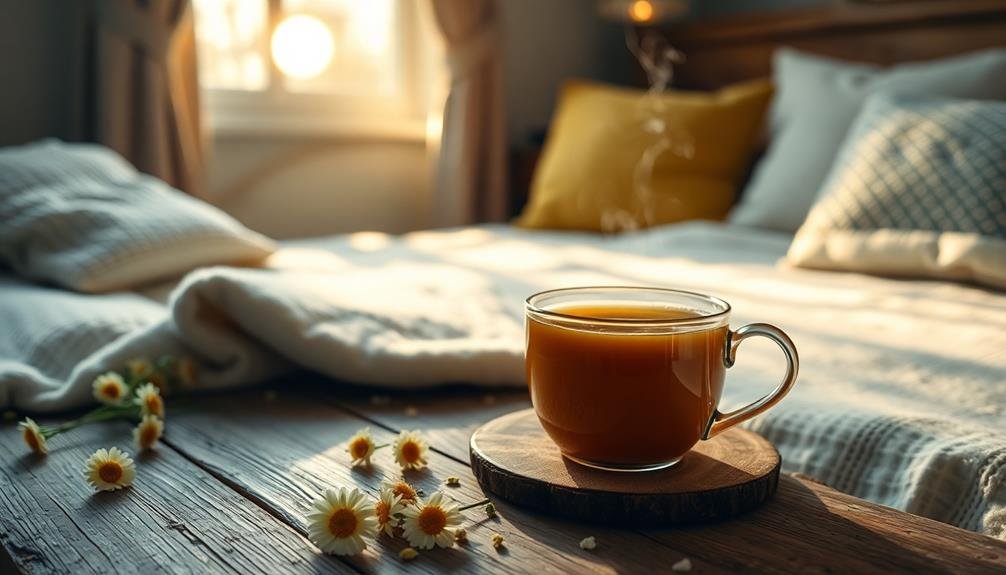
A cup of chamomile tea before bedtime can be your ticket to a restful night's sleep. This gentle herb has been used for centuries to promote relaxation and improve sleep quality. Chamomile contains apigenin, an antioxidant that binds to specific receptors in your brain, potentially reducing anxiety and initiating sleep.
When you brew chamomile tea, you're extracting its beneficial compounds, including flavonoids and essential oils. These components work together to create a mild sedative effect, helping you unwind and prepare for sleep.
Research has shown that chamomile can increase the production of glycine, a neurotransmitter that relaxes your nerves and muscles.
You'll find chamomile tea easy to incorporate into your nightly routine. Simply steep a tea bag or loose flowers in hot water for 5-10 minutes. For maximum benefits, drink it about 30 minutes before bedtime.
You can enhance its effects by pairing it with other sleep-promoting habits, like dimming lights and avoiding screens.
While chamomile is generally safe, consult your doctor if you're pregnant, nursing, or taking medications, as it may interact with certain drugs.
Valerian Root for Deep Slumber
Valerian root stands out among herbal sleep aids for its potent sedative properties. This powerful herb has been used for centuries to combat insomnia and anxiety. When brewed into a tea, valerian root can help you fall asleep faster and improve your overall sleep quality.
You'll find that valerian root tea has a strong, earthy aroma and taste. Don't let this deter you, as its benefits far outweigh its flavor profile. The active compounds in valerian root, including valerenic acid and valepotriates, work by increasing levels of gamma-aminobutyric acid (GABA) in your brain. GABA is a neurotransmitter that helps calm your nervous system and promote relaxation.
To experience the full benefits of valerian root tea, steep it for 10-15 minutes before bedtime. You may notice improved sleep patterns within a week of regular use.
However, it's crucial to consult with your healthcare provider before incorporating valerian root into your routine, especially if you're taking medications or have underlying health conditions. While generally safe, some people may experience mild side effects like headaches or dizziness.
Start with a low dose and gradually increase it to find your best balance for a restful night's sleep.
Lavender's Calming Properties
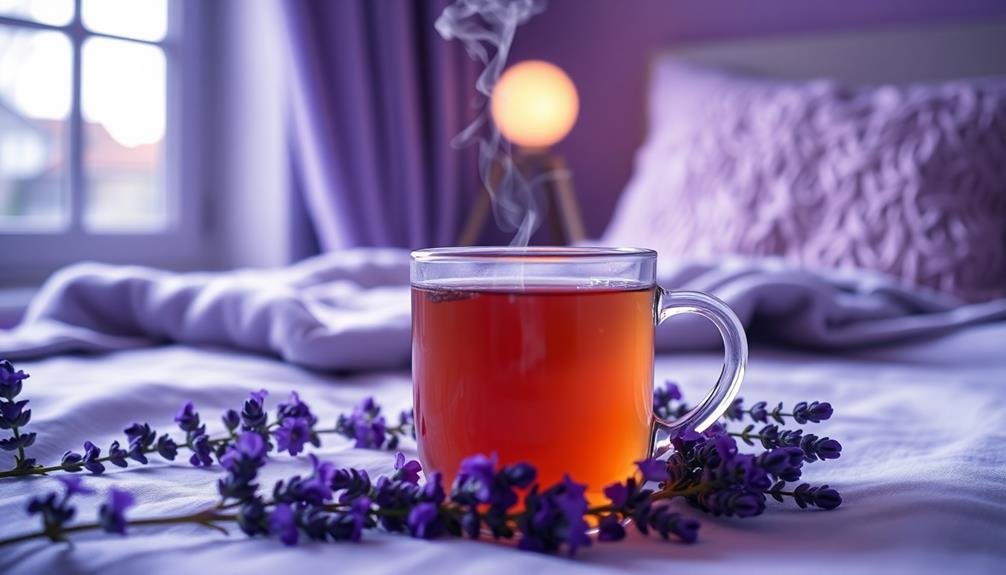
Lavender's gentle aroma has long been associated with relaxation and tranquility. This fragrant herb has been used for centuries to promote calmness and improve sleep quality. When you brew lavender tea, you're harnessing its natural sedative properties to help ease your mind and body into a restful state.
The active compounds in lavender, particularly linalool and linalyl acetate, interact with neurotransmitters in your brain to reduce anxiety and promote relaxation. These effects can help you fall asleep faster and improve your overall sleep quality.
You'll likely find that drinking lavender tea before bed helps quiet racing thoughts and soothes tension in your muscles.
Lavender tea is also caffeine-free, making it an excellent choice for evening consumption. You can enjoy it hot or cold, and it pairs well with other sleep-promoting herbs like chamomile or passionflower.
For best results, steep your lavender tea for 5-7 minutes to extract its full benefits. You may also consider adding a drop of honey for sweetness, which can enhance the tea's soothing effects and make it more enjoyable to drink.
Passionflower Tea for Anxiety Relief
Anxiety sufferers often turn to passionflower tea as a natural remedy for relief. This herbal tea has been used for centuries to calm nerves and promote relaxation.
You'll find that passionflower contains compounds that may increase levels of gamma-aminobutyric acid (GABA) in your brain, which can help reduce anxiety and improve sleep quality.
When you're looking to incorporate passionflower tea into your nighttime routine, consider these benefits:
- Reduced anxiety symptoms: Passionflower tea may help alleviate feelings of restlessness and racing thoughts.
- Improved sleep quality: By promoting relaxation, this tea can help you fall asleep faster and stay asleep longer.
- Natural sedative effects: Unlike prescription medications, passionflower tea offers a gentle, non-habit-forming alternative for sleep support.
- Potential pain relief: Some studies suggest that passionflower may have mild analgesic properties, which could help ease physical discomfort that interferes with sleep.
To prepare passionflower tea, steep 1-2 teaspoons of dried herb in hot water for 10 minutes.
You can enjoy this tea 30-60 minutes before bedtime to maximize its calming effects.
As with any herbal remedy, it's wise to consult your healthcare provider before adding passionflower tea to your routine, especially if you're taking medications or have underlying health conditions.
Lemon Balm: Stress-Reducing Herb
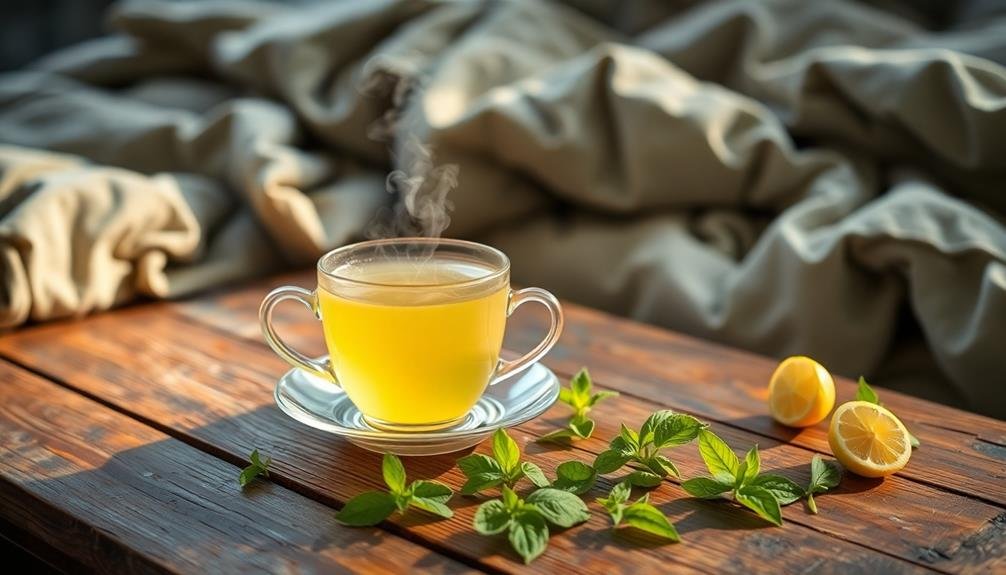
Lemon balm, a member of the mint family, offers a revitalizing and calming approach to stress reduction and better sleep. This versatile herb has been used for centuries to alleviate anxiety, promote relaxation, and improve sleep quality.
When brewed as a tea, lemon balm releases its soothing properties, helping you unwind after a long day.
You'll find that lemon balm tea has a mild, lemony flavor with subtle minty undertones. It's rich in compounds like rosmarinic acid and flavonoids, which contribute to its stress-reducing effects. These natural chemicals interact with your brain's GABA receptors, promoting a sense of calmness and tranquility.
To prepare lemon balm tea, steep 1-2 teaspoons of dried leaves in hot water for 5-10 minutes. You can drink it 30 minutes before bedtime to help ease your mind and prepare for sleep.
Regular consumption may also improve your overall mood and cognitive function.
If you're looking for a gentle, natural way to combat stress and enhance your sleep quality, lemon balm tea is an excellent choice. It's safe for most people and can be easily incorporated into your nightly routine.
Magnolia Bark's Sleep-Promoting Effects
Nature's sleep aid, magnolia bark, has been used for centuries in traditional Chinese medicine to promote restful sleep. This powerful herb contains compounds that interact with your brain's GABA receptors, helping to calm your nervous system and induce relaxation. When you're struggling with insomnia or restlessness, magnolia bark tea can be a gentle yet effective solution.
The sleep-promoting effects of magnolia bark are multifaceted:
- It reduces anxiety and stress, allowing your mind to unwind before bedtime.
- It helps regulate cortisol levels, balancing your body's stress response.
- It improves sleep quality by increasing the amount of time spent in deep, restorative sleep.
- It may help alleviate symptoms of sleep apnea and other sleep disorders.
To enjoy magnolia bark's benefits, steep a teaspoon of dried bark in hot water for 10-15 minutes before bedtime. You'll notice its slightly sweet, floral aroma as you sip.
While it's generally safe for most people, it's always wise to consult your healthcare provider before adding new herbs to your routine, especially if you're pregnant, nursing, or taking medications.
Hops: Not Just for Beer
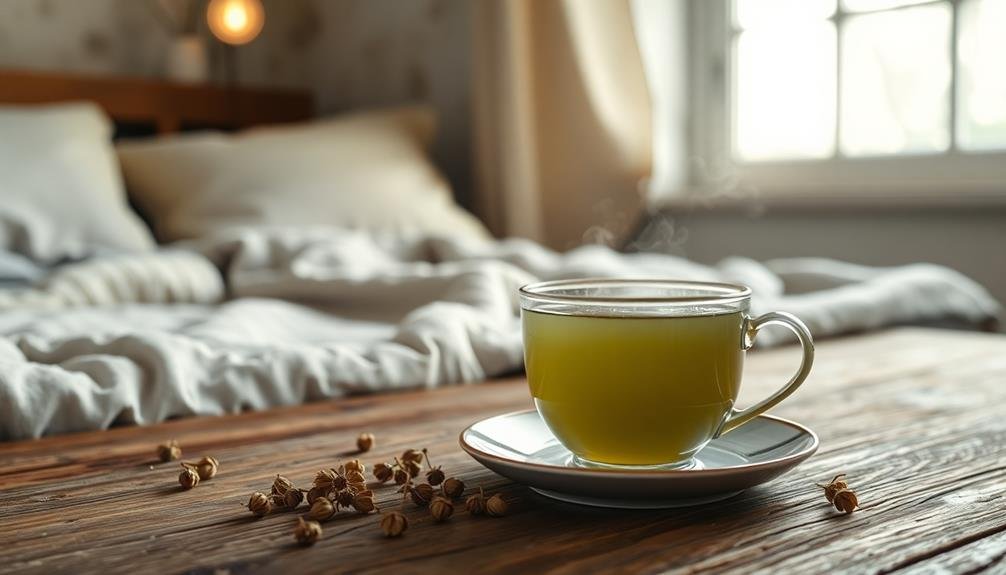
Plunge into the world of hops, and you'll discover they're not just for brewing beer. These cone-shaped flowers have been used for centuries to promote relaxation and improve sleep quality. Hops contain compounds like xanthohumol and myrcene, which have sedative effects on your nervous system.
When you're looking for a natural sleep aid, hops can be an excellent choice. You'll find them in various forms, including teas, tinctures, and even pillows. Drinking hops tea before bedtime can help you unwind and prepare for a restful night's sleep.
Here's a quick overview of hops' benefits and uses:
| Benefit | Form | Recommended Use |
|---|---|---|
| Reduces anxiety | Tea | 1-2 cups before bed |
| Improves sleep quality | Tincture | 30-40 drops at bedtime |
| Eases insomnia | Capsules | 400-500mg daily |
| Promotes relaxation | Pillow | Place near your head |
While hops are generally safe, you should consult your healthcare provider before using them, especially if you're pregnant, nursing, or taking medications. Start with small doses and gradually increase as needed to find your ideal sleep-inducing effect.
California Poppy's Gentle Sedation
California poppy can help you drift off to sleep with its gentle sedative effects.
You'll find this herb works by interacting with your brain's GABA receptors, promoting relaxation and reducing anxiety.
To prepare a soothing tea, steep 1-2 teaspoons of dried California poppy in hot water for 10-15 minutes before bedtime.
Calming Properties Explained
Renowned for its soothing effects, California poppy offers a gentle approach to improving sleep quality. This wildflower's calming properties stem from its unique blend of alkaloids, which interact with your brain's neurotransmitters to promote relaxation and reduce anxiety.
When you consume California poppy tea, you'll experience its sedative effects through several mechanisms:
- GABA enhancement: It increases the activity of gamma-aminobutyric acid (GABA), your brain's primary inhibitory neurotransmitter.
- Serotonin modulation: The herb influences serotonin receptors, helping to regulate mood and sleep patterns.
- Norepinephrine reduction: By decreasing norepinephrine levels, it helps lower stress and promote calmness.
- Melatonin support: California poppy may indirectly support melatonin production, aiding your natural sleep-wake cycle.
Unlike stronger sedatives, California poppy won't leave you feeling groggy or dependent. Its gentle action allows you to unwind naturally, making it an excellent choice for those seeking a mild sleep aid.
You'll find that regular consumption can improve both the quality and duration of your sleep, helping you wake up refreshed and rejuvenated.
Dosage and Preparation Tips
To prepare California poppy tea for ideal sleep benefits, you'll need to follow proper dosage and preparation guidelines. Start by using 1-2 teaspoons of dried California poppy herb per cup of boiling water. Steep the herb for 10-15 minutes, then strain and drink. You can enjoy this tea up to three times daily, with the last cup consumed about 30 minutes before bedtime.
For a stronger effect, you might consider using California poppy tincture. Add 30-40 drops of the tincture to a small amount of water and drink it 30 minutes before sleep. Don't exceed this dosage without consulting a healthcare professional.
When preparing California poppy tea, avoid using metal utensils or containers, as they may interact with the herb's compounds. Instead, opt for glass, ceramic, or wooden implements.
To enhance the flavor and efficacy, you can combine California poppy with other sleep-promoting herbs like chamomile or valerian root. However, always start with small amounts to gauge your body's response.
Blending Herbs for Optimal Results
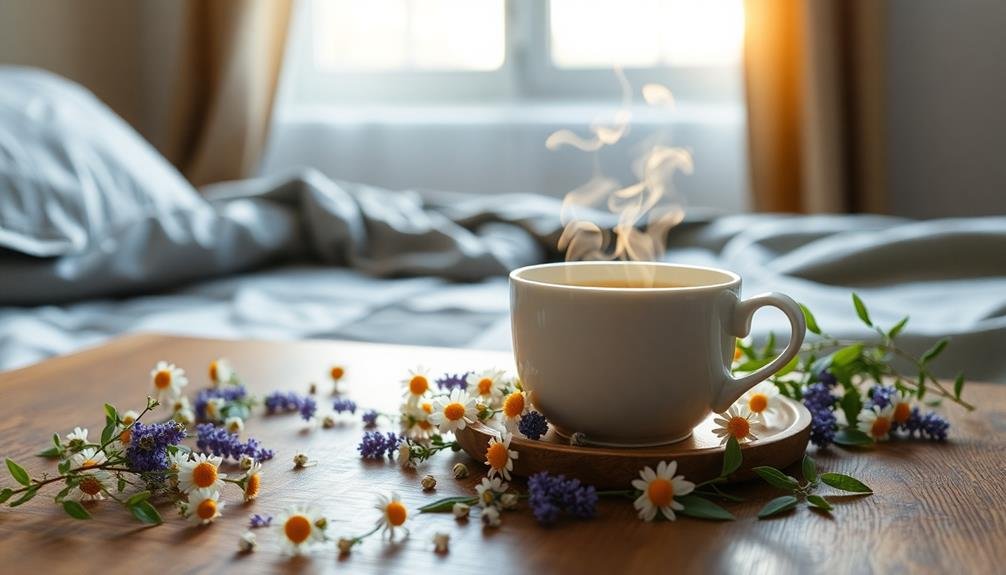
When you're crafting your sleep-promoting tea, consider blending herbs for enhanced effects.
Combining complementary herbs can create synergistic benefits, potentially amplifying their sedative properties.
You can experiment with personalized herbal blends to find the perfect mix that addresses your specific sleep challenges and preferences.
Complementary Herb Combinations
Blending herbs for sleep-inducing teas can enhance their effectiveness and create more balanced flavors. When combining herbs, you'll want to evaluate both their therapeutic properties and taste profiles. Some popular complementary herb combinations for better sleep include chamomile with lavender, valerian root with lemon balm, and passionflower with hops.
To create your own sleep-promoting herbal blend, assess these complementary combinations:
- Chamomile + Linden flower: This duo offers a gentle, floral taste while promoting relaxation and reducing anxiety.
- Valerian root + Skullcap: These herbs work synergistically to calm the nervous system and improve sleep quality.
- Passionflower + California poppy: Both herbs have sedative properties and can help ease insomnia and restlessness.
- Lemon balm + Holy basil: This combination supports stress reduction and promotes a sense of calm.
When blending herbs, start with equal parts of each and adjust to your taste preferences. Remember to steep your blend for at least 5-10 minutes to extract the full benefits of the herbs.
You can also add a touch of honey or stevia for sweetness if desired. Experiment with different combinations to find the perfect blend for your sleep needs.
Synergistic Sleep-Promoting Effects
Certain herbs, when combined, create powerful synergistic effects that can greatly enhance their sleep-promoting properties. When you blend complementary herbs, you're not just adding their individual benefits; you're creating a more potent, well-rounded sleep aid. For instance, combining chamomile with lavender can amplify the calming effects of both herbs, leading to deeper, more restful sleep.
Another powerful duo is valerian root and lemon balm. While valerian root is known for its sedative properties, lemon balm helps reduce anxiety and promote relaxation. Together, they create a synergistic effect that addresses both the physical and mental aspects of sleep difficulties.
You can also try blending passionflower with hops. Passionflower helps calm racing thoughts, while hops acts as a mild sedative. This combination can be particularly effective for those who struggle with sleep due to stress or overthinking.
When experimenting with herbal blends, start with small amounts and adjust according to your body's response.
Personalized Herbal Blends
The art of crafting personalized herbal tea blends offers a unique opportunity to tailor your sleep-inducing beverage to your specific needs. By combining various herbs, you can create a powerful synergy that addresses multiple aspects of sleep quality.
Consider your individual sleep issues, such as difficulty falling asleep or staying asleep, when selecting herbs for your blend.
To create an effective personalized herbal blend, follow these steps:
- Choose a base herb: Start with a mild, calming herb like chamomile or lemon balm as your foundation.
- Add a sleep-promoting herb: Incorporate valerian root or passionflower to enhance the sedative effects.
- Include a flavor enhancer: Use herbs like mint or licorice root to improve taste and provide additional benefits.
- Experiment with ratios: Adjust the proportions of each herb to find the perfect balance for your needs.
Remember to start with small amounts of each herb and gradually increase as needed.
Keep a sleep journal to track the effectiveness of different blends, noting any improvements in your sleep quality or duration.
Preparing the Perfect Sleepytime Tea
For the perfect sleepytime tea, preparation is key. Start by selecting high-quality, organic herbs to guarantee you're getting the most potent and pure ingredients.
Choose a ceramic or glass teapot, as these materials won't affect the taste of your tea. Boil fresh, filtered water to the appropriate temperature for your chosen herbs – typically between 190°F and 212°F.
Measure your herbs carefully, using about 1 teaspoon per cup of water. If you're using a tea bag, simply place it in your cup. For loose herbs, use a tea infuser or strainer.
Pour the hot water over your herbs and let them steep for the recommended time, usually 5-10 minutes. Don't over-steep, as this can make your tea bitter.
Once steeped, remove the herbs and add any desired natural sweeteners, like honey or stevia. Avoid sugar, as it can interfere with sleep.
Sip your tea slowly, preferably 30-60 minutes before bedtime. This allows time for the herbs to take effect and guarantees you won't need to use the bathroom during the night.
Frequently Asked Questions
Can Pregnant Women Safely Drink Herbal Teas for Sleep?
While some herbal teas can be safe during pregnancy, you should always consult your doctor first. Certain herbs may pose risks to your baby. Stick to pregnancy-safe teas like chamomile or ginger, but avoid excessive consumption.
How Long Before Bedtime Should I Drink Sleep-Promoting Herbal Tea?
You'll want to drink sleep-promoting herbal tea about 30-60 minutes before bedtime. This allows your body to absorb the calming compounds and gives you time to relax before hitting the sheets. Don't drink it too close to sleeping.
Are There Any Potential Side Effects of Drinking Herbal Teas Regularly?
While generally safe, regular herbal tea consumption can have side effects. You might experience allergic reactions, interactions with medications, or digestive issues. Some teas may cause drowsiness or insomnia. Always consult your doctor if you're concerned.
Can Children Consume Herbal Teas to Improve Their Sleep Quality?
You can give children some herbal teas to improve sleep, but be cautious. Stick to caffeine-free options like chamomile or lemon balm. Always consult a pediatrician first, as not all herbs are safe for kids.
Do Herbal Teas Interact With Prescription Sleep Medications or Other Drugs?
You should be cautious when combining herbal teas with prescription sleep medications or other drugs. They can interact, potentially increasing side effects or altering drug effectiveness. It's best to consult your doctor before mixing them.
In Summary
You've discovered the power of gentle herbal teas for better sleep. By incorporating these natural remedies into your nightly routine, you're taking a proactive step towards improved rest. Remember, consistency is key. Experiment with different herbs and blends to find what works best for you. Don't forget to create a calming environment and limit screen time before bed. Sweet dreams await as you sip your way to a more restful night's sleep.

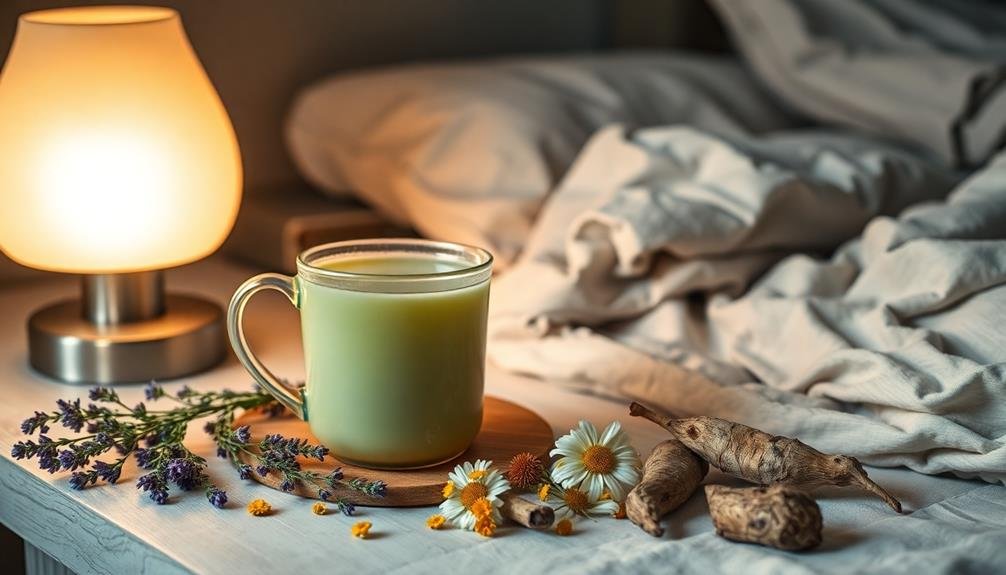



Leave a Reply